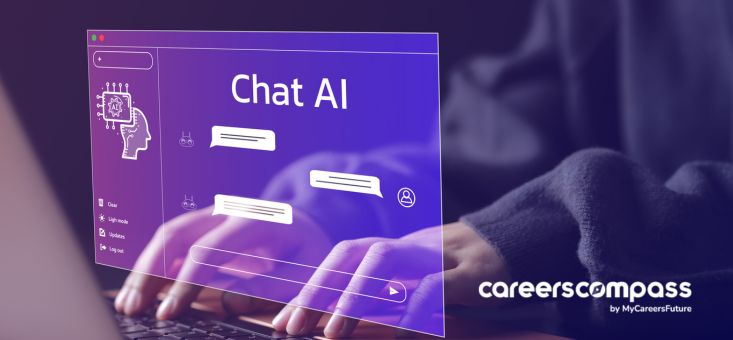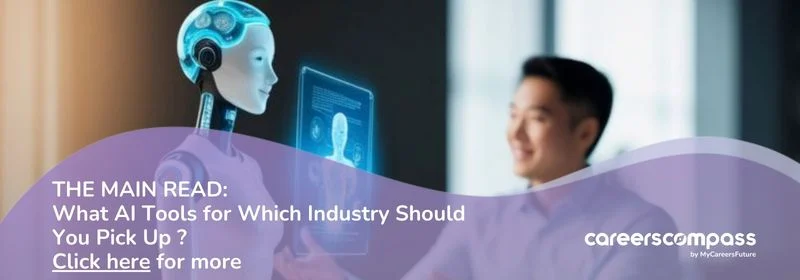Gone are the days of scouring job boards for hours and customising countless application forms and resumes.
Already, 72% of job applicants are using generative artificial intelligence (AI) in job applications, mainly for text composition. This is according to research from Arctic Shores, a research company.
Here’s a quick guide to how AI can boost your career chances.
AI can help craft the perfect resume and cover letter
AI-driven resume and cover letter builders have definitely raised the bar.
These tools analyse descriptions from job advertisements to create highly tailored resumes and cover letters that can give jobseekers a considerable competitive advantage. They can also help them pass the initial AI-powered application screening process unscathed.
There are a number of resume-building platforms like Rezi and ResumA.I that take the grunt work out of job applications.
Looking for a new role? Explore over 100,000 jobs available on MyCareersFuture now!
Jobseekers can simply upload their resume draft and share detailed descriptions from the advertisement on the platform to build customised resumes that match the needs of different employers in just a few minutes.
However, these platforms tend to require subscriptions or payments if you are looking to generate more resumes to apply to different companies.
For those who are not in an urgent need to secure a new job, free options like OpenAI’s ChatGPT or Google’s Gemini can help improve your CV writing too.
Users can leverage AI to make their bullet points more succinct or check for grammar errors.
However, there are limitations to using these free platforms as jobseekers will still need to copy, edit, design and format their resumes on their own.
Prefer learning by listening? Here’s a podcast to help!
Key highlights to listen to:
- (1:33) What are the latest AI tools to help with your resume and CV?
- (2:10) The pros and cons of using AI tools as part of your resume-building
- (4:30) Ethical factors to consider when using AI tools
More intelligence to help your interview chances
Another area where AI can be a game-changer is in interview preparation. Free GenAI tools like ChatGPT or career-specific chatbot CareerKaki can generate 100 interview questions that you should prepare for and how to answer them.
There are tools powered by AI, such as Google’s Interview WarmUp, which can simulate a real interview experience, offer feedback on verbal cues, and equip candidates to perform their best in a nonjudgmental setting.
Free AI job interview tools tend to be quite limited in their utility, typically offering only about five basic and generic screening questions such as “Tell me more about yourself” and “How do you handle a mistake at work?”.
For middle- and senior-level talent, mastering responses to such straightforward screening prompts may not be as challenging as they may think, as they can easily draw anecdotes from their career experiences.
Instead, they should focus more on preparing for behavioural and situational questions that assess their technical knowledge and leadership competencies.
These open-ended questions often require more thoughtful responses that go beyond what current AI tools can provide. Hiring managers tend to use these questions to prompt a jobseeker to better assess a candidate’s qualifications for higher-level roles.
Other subscription-based AI-powered platforms like Wizco’s Ava and Rightjoin offer a more customized interview experience tailored to your career. Some of these paid tools use AI to analyse your body language and overall impression conveyed during the mock video interview process.
For an added premium, some platforms will offer the chance for you to speak to a human expert, who will comprehensively evaluate and provide feedback on your interview performance.
When selecting an interview platform to prepare for a job interview, look for potential options designed for your industry. The ideal tool for a software developer will likely differ from those for project managers or digital marketers.
Your research in finding the best platform to use to prepare for a job interview in your industry allows you to practise questions and scenarios that are more likely to be asked by your hiring manager.
But use AI wisely – it can help, but it has limitations
While AI can be a powerful ally, it’s essential to understand its limitations and use it responsibly.
AI is not a substitute for making genuine human connections, and jobseekers must use these tools ethically. This indicates an end goal of augmenting rather than replacing traditional methods and human interaction.
Content generated by AI tools should be viewed as a means to an end and not a final product.
Always check for accuracy to ensure that you are not embellishing your resume with skills and experience that you are not equipped with yet.
You should also look out for misuse or even the lack of industry jargon. Right now, generative AI tools are not designed to understand the nuances and usage of specific industry jargon or technical terms that you would commonly use or are expected by the employer to know.
Furthermore, the AI tools that you use may not consider the context of your local cultural interactions.
While some words may be commonly used in some markets, they could be offensive to use in other local cultures.
Whether you are using AI for text composition or to build a resume from scratch, always spend some time checking the accuracy of the information. Make sure that they reflect your actual skills, experience and what you look for in a company.
Even though AI developments have come a long way, they cannot teach you empathy, how to work effectively in teams or how to build a connection with your interviewer.
More often than not, it is the human touch that ultimately seals the deal in most hiring decisions.
Apart from using AI tools to prepare your CV and showcase your job-related skills, don’t forget to also practise your interview skills with friends and family.
They know the most about you and can offer suggestions on how you should communicate better to build rapport and trust with your interviewer.
When it comes to salary negotiations…
Salaries can vary widely across industries, even for similar roles. This is because factors like job scope, team size, growth outlook, and company size all come into play when calculating pay.
As AI tools usually rely on information retrieved from public domains and other users who have consented to sharing their conversations to improve the platform, it is unlikely that you will receive reliable and up-to-date information about your salary from the platform.
The salary negotiation process requires finesse and human judgement to ensure a fair deal for both parties. Instead of solely depending on AI or online sources to determine your negotiation strategy, consider seeking advice from your mentors or friends within your industry.
This article is contributed by Randstad Singapore.
![]()
















